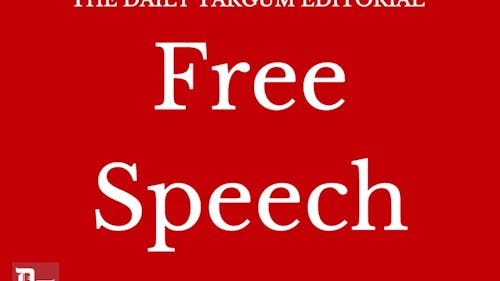EDITORIAL: Academic freedom entails free speech

Universities have an incredible capacity to promote intellectual progress through research and discussion, which is why freedom of speech, as well as thought, are so important on college campuses. A University that seeks to promote academic freedom must be careful when making decisions about the extent of the faculty’s right to free speech and their personal backgrounds, as censoring, banning or forbidding specific ideologies can lead us down a perilous road.
In the cases of Michael Chikindas and Mazen Adi, two professors who have been brought up in campus conversation recently for their controversial backgrounds, the issue is quite complicated.
Chikindas is a professor in the Department of Food Science. He published multiple insensitive and anti-Semitic posts on his social media accounts while working for Rutgers. Adi is a professor for the Department of Political Science who served as a diplomat and legal adviser for Syria to the United Nations under Bashar al-Assad — the president of Syria and a man who is thought by many to be a war criminal. Both professors actually have commendable teaching records and were not necessarily unpopular, at least not before this news broke. So the question becomes: how do we create an environment where everyone feels safe and has equal opportunity to succeed while also adhering to free speech values and the Constitution? Do free speech and academic freedom take priority over the comfortability of students?
Chikindas’s speech on his social media accounts is covered legally, and that has already been established. But his behavior gives way to the possibility of tainting the school’s proclaimed values of acceptance and equality. In the case of Chikindas being openly anti-Semitic online, it is reasonable to assume that some students in the Jewish community may very well believe that their chances to succeed in a class taught by him are diminished. And it is true — how can we really be sure that there is no bias involved when he grades the exam of a Jewish student when those biases evidently exist within him? Professors have absolute freedom of thought and opinion, but when it impedes on their ability to teach, or, alternatively, impedes on a student’s ability to learn from them, it becomes a different issue.
Adi’s credentials to teach at the University are unquestionable. When it comes to teaching political science, especially international relations, Adi is someone with valuable, first-hand experience at the University. His career history likely gives him a unique perspective on the subject matter that he teaches. With that said, he worked for the Syrian government — a government that is accused of violating human rights and committing war crimes, something the University was well aware of when hiring him. To what extent does his former affiliation with Assad’s regime play into his ability to teach here fairly? There is no definitive answer here. With that said, learning from a professor who is able to give the extent of personal insight that Adi is able to give is something that all students should get to experience.
The lines around acceptable faculty speech are not black and white, and the University cannot simply fire any professor that speaks contrarily to the popular opinion, even if their speech is offensive. But students should still feel encouraged to come forward and discuss why they feel uncomfortable about a certain professor and even to protest the employment of that professor, as is being done with Chikindas. In the future, the University should also make sure that all students in a particular professor’s class have a reasonably equal opportunity to thrive and pass that class.
In the end, freedom of speech does not entail freedom of consequences. Professors need to be held to a high standard in terms of fair-mindedness and their ability to gain and maintain the trust of their students. After all, professors do not just teach classes, they also serve as mentors and offer career advice.
The Daily Targum's editorials represent the views of the majority of the 149th editorial board. Columns, cartoons and letters do not necessarily reflect the views of the Targum Publishing Company or its staff.



